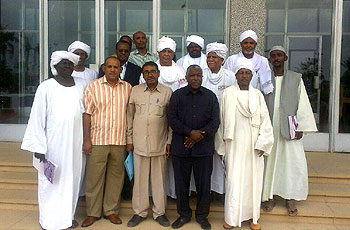Sudan dialogue parties divided over 2015 elections
August 16, 2014 (KHARTOUM) – Sharp differences have emerged within Sudan’s national dialogue committee known as 7+7, comprised of government parties and opposition ones on Saturday during a press conference to declare the roadmap of the ongoing national dialogue process.

The roadmap which was endorsed by the committee did not arrive at an agreement on the elections issue and referred it to the national dialogue conference within the coming two days.
The committee member from the opposition side, Mustafa Mahmoud, said the elections issue will be discussed during the national dialogue, stressing they understand the reasons behind government adherence to hold elections on time.
Sudan’s general elections are set to be held in April 2015.
The opposition forces participating in the national dialogue call for delaying elections and forming a transitional government but the ruling National Congress Party (NCP) refuses to postpone the elections in order to avoid any constitutional vacuum following the end of the current government’s term.
Sudan’s National Elections Commission (NEC) had officially embarked on preparations for holding elections and declared timetables and schedules besides contacting the international community to collect the cost of the election process which is estimated at 800 million Sudanese pounds (SDG).
According to the roadmap, decisions within the national dialogue conference will be taken by consensus and members would resort to voting only in cases of sharp differences and the wining opinion must yield at least 90% of the votes.
The roadmap stated that president Omer Hassan al-Bashir will chair the dialogue conference and is to be replaced in his absence by one of the leaders of political parties participating in the dialogue.
It added that the national dialogue conference will be held under the banner “Sudan is a country which accommodates all its people”.
The 7+7 committee agreed that each political party will be represented by two delegates in the conference besides one delegate in each of the six subcommittees which will discuss the dialogue’s issues.
It was also agreed that the African Union and the Arab League are to be invited to participate in the national dialogue conference as observers.
The presidential assistant and member of the committee, Ibrahim Ghandour, said that 50 national figures would participate in the conference, pointing to ongoing consultations to name them.
He accused unnamed political forces of dealing with the country’s issues on a tactical basis without taking into consideration the higher interests of the country, stressing that dialogue would soon kick off without waiting for anybody.
But he pointed that they are currently facing the daunting challenge of convincing those who refused to participate in the national dialogue.
The leading figure at the Reform Now Party (RNP), Hassan Rizq, said that the roadmap called for releasing all political prisoners including the leader of the Sudanese Congress Party (SCoP), Ibrahim al-Shiekh, and the deputy chairman of the National Umma Party (NUP), Meriam al-Mahdi, besides allowing political liberties and freedom of expression and publication.
He added that the roadmap also demanded giving the necessary guarantees of personal safety for the rebels in order to enable them to participate in the dialogue, pointing that all these issues are requirements of the dialogue.
The roadmap also stated that judiciary will be responsible for tackling issues of publication and expression without resorting to exceptional measures through the National Intelligence and Security Services (NISS), particularly during the dialogue conference.
It also called for agreement on the necessary legislations and procedures for holding free and fair elections under the supervision of a politically, financially, and administratively independent commission.
The roadmap further mentioned agreement on forming six subcommittees to discuss the dialogue’s issues before submitting recommendations to the dialogue’s chairman besides forming a general secretariat comprised of efficient national figures to monitor the sessions and write meetings minutes and points of contention and submit them to the higher coordination body.
The member of the 7+7 committee from the government side, Tijani al-Sissi, said the committee only agreed on general principles, noting the detailed discussions of the issues would take place in the national dialogue conference.
He stressed that the contacts with arms bearers would continue in order to convince them to participate in the dialogue.
Last January, Bashir called on political parties and rebel groups to engage in a national dialogue to discuss ways to bring peace in the country and to discuss constitutional reforms.
The opposition alliance of the National Consensus Forces (NCF), gathering left forces, boycotted the political roundtable, asking the government to first to stop war and create a conducive environment for the dialogue.
Opposition forces participating in the dialogue are also raising the same concerns but argue that such matters can be discussed within the national dialogue mechanism.
However, National Umma Party (NUP) leader Sadiq al-Mahdi suspended its participation in the political process after his detention in May.
Mahdi now demands the restoration of political freedoms and inclusion of rebel groups in the political process. However, he calls for exclusion of the small political forces at this stage and involving only the “six historical parties”.
Last week, he signed a joint political declaration with the rebel alliance of the Sudan Revolutionary Front (SRF) in Paris where they call for unifying political opposition forces over peace and democratic reforms.
(ST)
